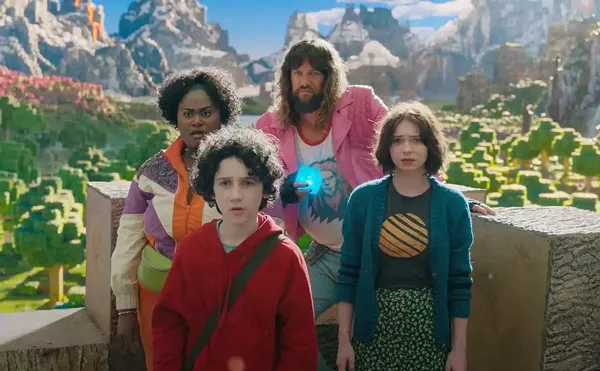The Wolfpack: B
If you thought your family was dysfunctional, take a gander at the Angulos, seven children (six boys and one developmentally disabled girl) who were raised as caged shut-ins in their cramped Manhattan Lower East Side apartment. Oscar, their Peruvian-born father was a failed musician who became increasingly paranoid and controlling (or so we are told). He believed his family should be protected from the corrupting influences of "socialization" and convinced his boys that their confinement would shield them from the influences of the evil outside world. Susanne, their hippy mother, went along with the plan.
The one caveat to this isolation was that the boys are permitted access to movies. Amassing a DVD library of nearly 5,000 titles, the brothers become obsessed, watching their favorites over and over, writing down every word of dialogue, and even constructing cardboard costumes and props to re-enact scenes. Not surprisingly, stylized expressions of male machismo in Reservoir Dogs, The Dark Knight, Goodfellas, and The Godfather spoke deeply to them. Eventually, the Angulo's 20-something eldest son, Mukunda, decides to challenge his father's rules and ventures out into the world, inspiring his brothers to join him.
The Wolfpack is what happens when a filmmaker of limited talent gets the scoop of a lifetime. Crystal Moselle's Sundance-winning documentary keeps an arm's length vantage point as it observes the brothers' attempt to integrate into a society they don't fully understand. It's riveting to watch these well-spoken boys set out on their own, experiencing the joys and fears of everyday life for the first time ... and, of course, women.
But after the film's engaging first third, you can't help but start asking the questions Moselle doesn't bother to address. How did she connect with the Angulos in the first place? Didn't anyone — government agencies, school officials, neighbors, other family members — know about their imprisoned children? What were the financial challenges to raising such a family? Was there friction between husband and wife? How did the kids turn out to be so well-mannered and sane? Moselle's film doesn't provide any meaningful information and provides startlingly little context for how the "wolfpack" came to be. Heck, we don't even learn how the brothers obtained their films or whether they had access to the Internet.
Through awkward interviews, home videos, and a foreboding soundtrack, Moselle certainly sets out to portray Oscar as the villain of the story, but, in the end, he seems more pitiable than abusive, mostly haunting the background of her frame. Sure, his sons struggle in their initial social interactions (Mukunda's first foray into the world has him dressing like Halloween's Michael Myers and silently stalking area shops; he ends up arrested), but they mostly come across as pleasant, engaging young men, free of the typical corrupting teen influences (drugs, sex, video games, bullying). Furthermore, the strength of their emotional bonds are undeniable. So, is there something to be said about Oscar's parenting choices? Moselle never bothers to ask.
From a filmmaking perspective, The Wolfpack similarly comes up short. Moselle's aesthetic would be best described as slapdash and meandering, with under-lit shots and an inability to distinguish the boys from one another (they all sport similar haircuts and dress). One brother eventually moves out to become an anti-fracking activist, and mother Susanne tries to reconnect with her alienated family, but these are passing details. Moselle focuses mainly on Mukunda's love of film, dedicating large chunks of screen time to how he puts together his cinematic pantomimes — a cardboard re-creation of the opening sequence from The Nightmare Before Christmas (complete with open fire pit), is both endearing and unnerving. As captivating as these sequences are, the film neglects to address the domestic details that would provide context to its fascinating subjects.
Nevertheless, the siblings' social estrangement and elaborate, handmade rituals prove compelling enough to make The Wolfpack worth watching. Moselle ably captures the brothers' group dynamics, while making the case that mainstream movies have the ability to humanize even the most sheltered individuals. The brothers' closed-off existence may have shaped who they are, but it did not ruin them. They have emerged from their social isolation as affable, intelligent young men. It's the kind of weird urban tale that highlights how little we actually know about the people who live among us.
Follow Metro Times film critic Jeff Meyers on Twitter:






